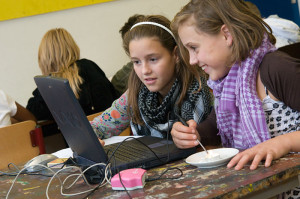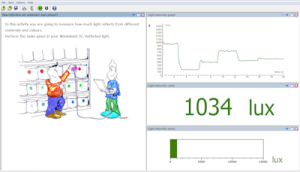What is sound? How to keep tea warm? Can you measure light?
Primary school pupils are curious about their surroundings and have many science questions. Can technology help in teaching and learning science at Primary School?
The core of science is about investigating, exploring, asking questions, analyzing, and thinking – activities that technology can uniquely facilitate and deepen. The educational research studies showed that technology such as data-logging can work positively already at the primary school level. Based on our experience with the use of ICT we has developed products and teaching materials which can be used at Primary School. With the €Sense interface and its sensors, and the Coach software students can carry many different science investigations. ‘Real-time’ display of the “measured data” on the computer screen allows students to make direct links between the phenomenon and the graph. Such immediate feedback encourages critical thinking skills; students have time to spend on observing and interpreting, discussing and analysing data. Students can quickly repeat the experiments, change experimental conditions and explore the results of the changes. This facilitates an interactive approach to the experiment. “Let’s see what happens if … “.
Our materials for primary school level learn students not only basic science concepts but also allow to develop students’ mathematical skills in reading and interpreting graphs and language skills in using science terminology.
Products
Do you like to let the students use technology at primary school level? Our products will help you.
Teaching Resources
CMA has created a series of technology-enhanced inquiry based activities. The activities can be used in science lessons for students between 8-12 years old and should help teachers, with little experience in science education, to introduce the use of sensors into their science lessons.

